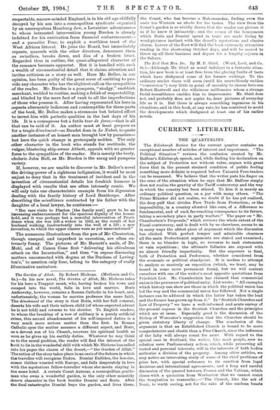The Garden of Allah. By Robert Hichens. (Methuen and Co.
6s.)—In his new novel, The Garden of Allah, Mr. Hichens takes for his hero a Trappist monk, who, having broken his vows and escaped into the world, falls in love and marries. Boris Androvsky, however, remains a Roman Catholic in his heart, and, unfortunately, the woman he marries professes the same faith. The denoilment of the story is that Boris, with her full consent, deserts his wife and their unborn child (of whose expected advent he is not told) and returns to his cloister. To English readers, to whom the breaking of a vow of celibacy is a purely artificial crime, this second abandonment of his self-imposed duties is a very much more serious matter than the first. In Roman Catholic eyes the matter assumes a different aspect, and Boris, as a devout son of his Church, recovers his spiritual health as soon as he gives up his earthly duties. Whatever he may think as to the moral problem, the reader will find the interest of the book to lie in the wonderful skill with which Mr. Hichens has called into his pages the charm of the desert,—" the Garden of Allah." The action of the story takes place in an oasis of the Sahara in which the traveller will recognise Biskra. Domini Enfilden, the heroine, comes thither wearied with Europe, and falls desperately in love with the mysterious fellow-traveller whom she meets staying in the same hotel. A certain Count Anteoni, a cosmopolitan gentle. man who owns a wonderful garden, is the only other minutely drawn character in the book besides Domini and Boris. After the final catastrophe Domini buys the garden, and lives there, the Count, who has become a Mahommedan, finding even the oasis too Western an abode for his tastes. The view from the Count's garden is so vividly drawn that the reader can picture it as if he knew it intimately ; and the scenes of the honeymoon which Boris and Domini spend in tents are mado living by word-pictures instinct with the desert's mysterious and elusive charm. Lovers of the East will find the hook extremely attractive reading in the shortening October days, and will he moved to throw up all their business and depart for a lengthy sojourn in the Sahara.


















































 Previous page
Previous page